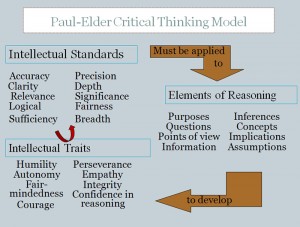一談起「愛智」就會想起「思考」;
一談起「思考」,當然立即會想起「批判」這個詞彙,
因為批判、思考和追求追求「道/真理/智慧」三者之間,
有不可分割的關係。
Any man who reads too much
and uses his own brain too little
falls into lazy habits of thinking.
( Albert Einstein )
The important thing is not to stop questioning.
( Albert Einstein )
愛智 → 思考 → 懷疑/問問題 → 批判 → 迫近真理
「批判」重視追求「真」,重視參與者的「誠」,
所以「批判」重視光明磊落,接受所有有批判能力的人參與,
只歧視無知和愚昧,不歧視膚色、種族、相貌、性別、年齡…
而且必定讓批判的課題公開放在桌面之上,讓所有參與者檢測。
中國古代亦有和西方「批判思考」相似的說法:
1. 學和思必須互相結合
「學而不思則罔,思而不學則殆。」《論語。為政第二》
2. 如何做思的功夫
「博學之,審問之,慎思之,明辨之,篤行之。」《中庸》
所以西方的所謂「批判思考」,
其實就是儒家「做學問」功夫裡的「審問,慎思,明辨」,
也就是所謂的「格物致知」!
然而凡是想進行任何高質素的批判,必須先「博學」,
接觸所有和批判課題有關的知識。
1. No thinking is content-free.
Knowing how and knowing that are inseparable.
2. Thinking is always thinking about something.
3. Thinking about something requires knowledge
of that something as much as possible.
Therefore, it is usually interdisciplinary.
4. Thinking begins by asking questions and
learning how to ask questions.
5. Thinking, by its very nature, is critical.
6. Thinking requires both analytic and holistic
skills and approaches.
( Jason Ling )
可惜關於「博學」這個要求,除了鼓勵勤奮之外,
儒家並沒有提出更好的解決方法。
那麼在知識高速膨脹、偏才充斥的世代,
如果人類的文明要進一步發展,
我們可以如何解決「博學」這個要求呢?
中國人往往只能夠將「博學」的要求變成口號,
反而西方人在他們科學的發展過程中,
發現了利用「集體智慧」及「互相批判」,
來彌補難以達到「博學」這個要求的缺失,
因為「博學」對任何一個人來說,都可能是過份的要求!
其次,「批判思考」中的「審問」功夫,
就是要懂得如何「問問題」及必要時向高明者請教。
再其次,「批判思考」中的「慎思,明辨」功夫,
就是要具備分析能力及徹底 [鍥而不捨] 思考的態度,
直至能夠分辨問題的關鍵為止。
不喜歡思考、懶於思考或者沒有能力思考的人,
肯定和「批判」絕緣!
「批判」是愛真理、愛智慧的人的遊戲。
Reflective thinking is always more or less
troublesome because it involves overcoming
the inertia that inclines one to accept
suggestions at their face value; it involves
willingness to endure a condition of mental
unrest and disturbance. Reflective thinking,
in short, means judgment suspended during
further inquiry; and suspense is likely to be
somewhat painful… To maintain the state
of doubt and to carry on systematic and
protracted inquiry──these are the essentials
of thinking.
( John Dewey )
再其次,所謂「批判思考」就是拒絕虛偽,
亦拒絕思考方面「懶惰,適可而止、半途而廢」的心態。
It’s not that I’m so smart,
it’s just that I stay with problems longer.
( Albert Einstein )
最後,我們必須明白批判必然是面對所有的「人、事、物」:
1. 講是非黑白對錯,所以必須先建設一套可靠的標準。
2. 既向外,又向內,沒有人可以例外,拒絕講人情。
3. 既重視上智,重視品味,亦歧視下愚。
儒家既然一早掌握了「批判精神」,為何在儒家獨大之後,
其後的中國人竟然失去了批判的精神,是值得研究的課題。
也許是由於中國文化重視「先尊師、後重道」,
過份重視父親和長輩的權威,面子、輩份、學歷,
多於重視真理,所以中國人忽視了「集體智慧」的建設。
姑且不說忽視「集體智慧」而導致中國文化中科技的落後,
單從修行的角度來審視,
我們的所謂「審問」究竟是如何審?
我們的所謂「慎思」可以慎到甚麼程度?
我們的所謂「明辨」可以明到甚麼程度?
我們的所謂「格物」用甚麼方法去格?
似乎儒家對這些課題完全沒有繼續追究下去。
禮失求諸野,對追求真理的「真和誠」,
對鍥而不捨的「懷疑和批判精神」,我們只能夠向西方學習。
Truth is the cry of all, but the game of the few.
( Bishop Berkeley, Siris, 1744 )
照筆者淺薄的認知,「批判」這個詞彙,
源自德國哲學家康德 Immanuel Kant (1724-1804)
《純理性之批判》 Critique of Pure Reason 。
Critique 原本是指評論的文章或書籍,是一個名詞,
但由於書中論及的是著重說理的批判精神,
所以哲學界就借用了「批判」這個詞彙來做形容詞和動詞。
康德說:
「我們的時代就是批判的時代本身,
一切事物都要受到批判的考驗。
宗教出於自身之神聖,立法出於自身之莊嚴,
都想免受批判的考驗。
但它們這樣做反而引起懷疑,因而得不到理性真誠的尊重;
只有能經受理性自由及公開的考驗者,
才會得到真誠的尊重。」
康德認為「批判精神」是「認知和思考」的最高主宰。
But the secret of intellectual excellence is the
spirit of criticism ; it is intellectual independence.
And this leads to difficulties which must prove
insurmountable for any kind of authoritarianism.
The authoritarian will in general select those who
obey, who believe, who respond to his influence.
But in doing so, he is bound to select mediocrities.
For he excludes those who revolt, who doubt,
who dare to resist his influence. Never can an
authority admit that the intellectually courageous,
i.e. those who dare to defy his authority, may be
the most valuable type. Of course, the authorities
will always remain convinced of their ability
to detect initiative. But what they mean by this
is only a quick grasp of their intentions, and
they will remain for ever incapable of seeing
the difference.
( Karl R. Popper, The Open Society and Its Enemies,
Volume 1 : The Spell of Plato )
「批判」在英語中,其實並沒有一個完全貼切的詞彙,
最接近的就是 Critical analysis, Critical inquiry
和 Critical thinking。
可惜的是英語中,critical 這個字除了上述的意思之外,
其實還有其他的意思,例如;
1. [貶義] 吹毛求疵、非議、批評、指責、挑剔
2. [中性] 判斷、評鑑、評論
3. [時刻] 重要的、決定性的、關鍵的、危急的
4. [健康] 非常嚴重、危險的
5. [物理學] 臨界的
這些其他意思中的第一點,尤其假設了對方的批評是理虧的,
是一種言語上欺凌的行為。
所以用英語中 critical 這個字,容易引起不必要的誤解。
中國人聽到「批判」這個詞彙,
尤其容易聯想起中共文化大革命時代的「批鬥」,
做成阻礙中國人思考上進步的原因之一。
所以西方人已經開始用德文原文 critique 這個字,
來表達「批判」這個概念。
問題是「批判」當然是嚴肅、嚴謹、鍥而不捨、重視說理的事情,
和吹毛求疵的分別在於「邏輯」、「動機」和「程度」,
所以智力較低的人難以清楚辨認它們的分別。
一般人都忽略了的是,「批判」其實分為兩大部份:
1. 批判精神 Critical attitude
2. 批判行為 Critical speech or writing
智力較低的人不但不懂得分辨「批評」和「批判」,
而且亦不可能明白「批評一個人和批判他的思想,
絕對是兩回事!」
筆者按:
至於 critique 這個字的中文翻譯,
中文裡似乎只有「批判」這個詞彙才足以表達
「一小撮重視真理的人,從激烈的辯論中互相擦出火花,
令真理越辯越明,最後不但產生學問、科技和智慧﹐
更產生了西方文明的精華──科學精神」的這種情況,
就好像「哲學」這個名詞也是由日本引進的情況一樣。
民國初年的五四運動,提倡引入西方的「賽先生」science,
但由於沒有同時引進「批判思維」,失去了西方文明的神髓,
所以提出「中學為體、西學為用」的張之洞,
犯下了「只見表面效益,不懂效益根源」的嚴重錯誤,
因為當代國學的體早已腐朽,只餘金玉其外的軀殼,
內裡根本已經沒有了「批判思維」的概念。
